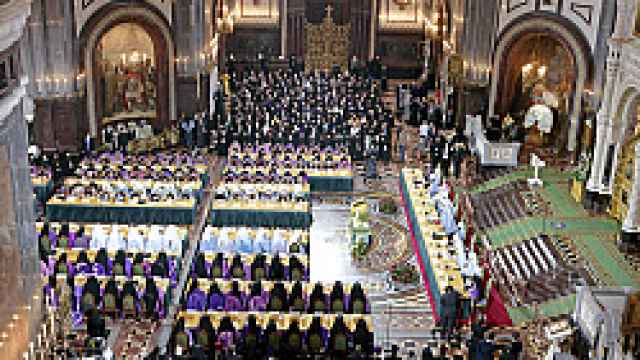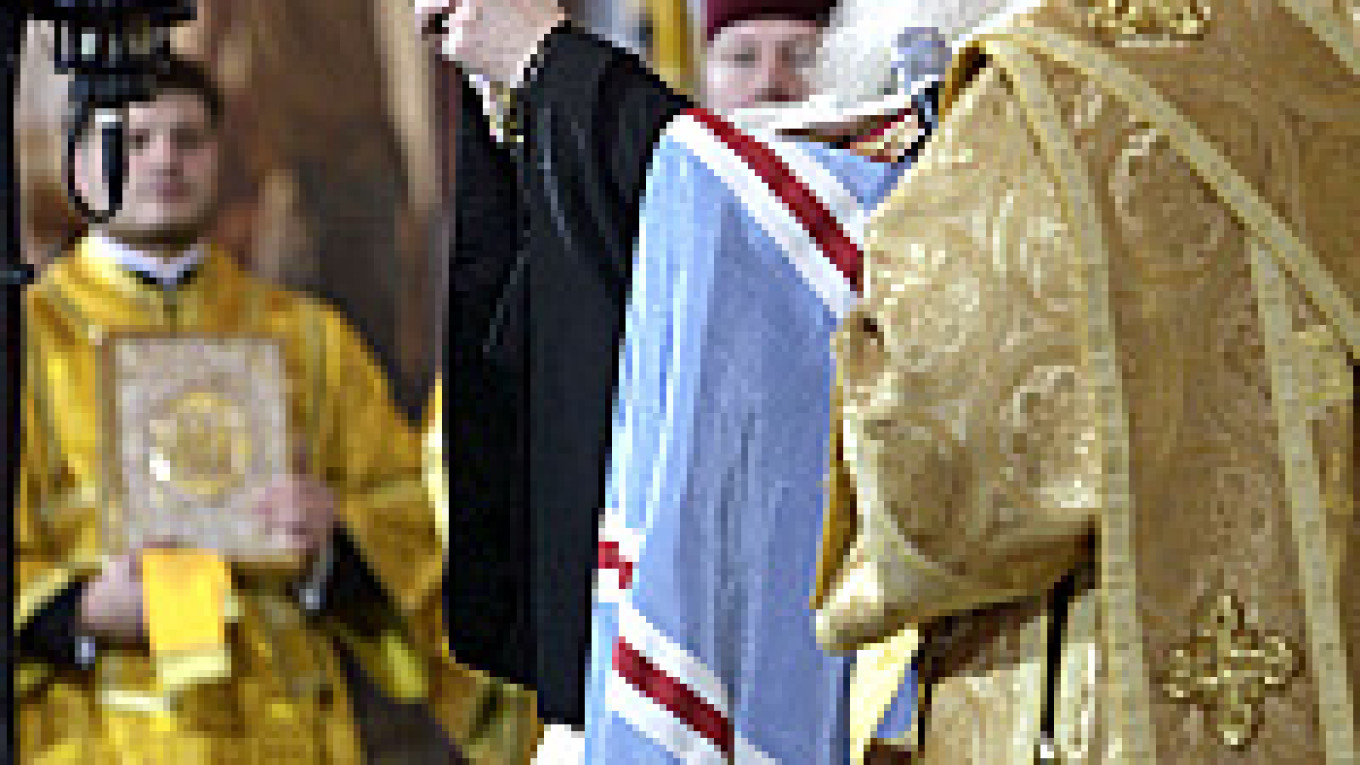Kirill, the interim leader since Patriarch Alexy II's death on Dec. 5, won 508 votes cast by the 702-member Local Council, Metropolitan Vladimir of St. Petersburg and Ladoga announced in the main hall of Christ the Savior Cathedral at 10 p.m. The secret ballot was held in the cathedral, where the new patriarch will be crowned next Sunday.
Kirill, 62, is an experienced diplomat who has been the church's point man in often-difficult negotiations with other churches, prompting speculation that he might take steps to improve ties with the Roman Catholic Church, which have been fraught with rivalry for years.
Kirill seemed to dampen such hopes in an address just before Tuesday's vote, complaining about Catholic and other missionaries working in Russia.
"We have noted with bitterness that members of the Catholic clergy and monastic orders are among the newly formed enlighteners of Rus," he said, Interfax reported.
Kirill also criticized "the assault of aggressive Western secularism against Christianity" and "attempts by some Protestant groups to revise the teachings of Christianity and evangelical morality."

Igor Tabakov / MT
Senior Russian Orthodox clerics attending a session Tuesday to elect the patriarch in Christ the Savior Cathedral.
| |
Kirill's election with a 72 percent margin came as no surprise after he emerged as the front-runner in a preliminary vote last Sunday among senior bishops, who nominated him with 97 out of 197 votes. The council of bishops had also nominated Metropolitan Kliment of Kaluga and Borovsk, with 32 votes, and Metropolitan Filaret of Minsk and Slutsk, with 16 votes.
But Tuesday's election was reduced to a two-horse race after Filaret, who heads the Orthodox Church in Belarus, withdrew his candidacy. Filaret later said he wanted to strengthen unity within the church: "We must be unanimous, that is why I decided to withdraw. This is not a sign of protest," he said in televised comments.
The Local Council decided not to exert its right to bring forward new candidates. Kliment, 59, manages the church's economic affairs and has been described as the candidate favored by the Kremlin.
Although the church has been historically close to the government, Kirill had been widely expected to be the most likely successor to Alexy II. A good orator, he has headed the church's department of external affairs since 1989 and hosts a weekly show called "The Pastor's Word" on Channel One.
Religious experts said Kirill's commitment to reconciliation with the Catholic Church should not be overestimated and that hopes of a meeting with Pope Benedict XVI were premature.
"You cannot start your reign with a meeting with the pope -- you can end it with that," said Andrei Zolotov Jr., founding editor of Russia Profile magazine and a long-standing expert on church affairs.
Zolotov said Kirill was probably the better candidate because he had qualities that Kliment lacked. "Kirill is a strategic thinker and he has a vision, while Kliment is more of a complacent character," he said. "Of course, Patriarch Kirill will be different from Metropolitan Kirill, and his views on ecumenical and modernization issues have to be more cautious."
The church's political significance was highlighted by President Dmitry Medvedev, who said in a statement read to the council and posted on the Kremlin's web site that he was confident its decision would "further develop the fruitful cooperation of the Russian Orthodox Church and the state."
Kirill has said the church's relations with the state should be based on "mutual noninterference in each other's affairs."
Under Alexy II, who became patriarch in 1990, the church has been transformed from an oppressed and closely controlled group in an atheist state into a thriving organization enjoying government support for reviving national tradition. About three-fourths of Russians identify themselves as Orthodox believers, but few attend services regularly.
"The church in Russia plays a bigger role than in other developed countries because it is important for bringing back traditions that were lost [during the Soviet period]," said Thomas Bremer, a professor at the University of M??nster, Germany, and an expert on interchurch relations. "It is big integrating force in society."
Boris Dubin, an analyst with the Levada Center, said that the government could not afford to ignore the church because it was one of three institutions that people trusted. "People place their trust in the president, the army and the church," he said.
He added that all three were hierarchical organizations and that the church was seen as a partner of the state and a moral institution. "It is practically seen as a state institution," he said.
A Message from The Moscow Times:
Dear readers,
We are facing unprecedented challenges. Russia's Prosecutor General's Office has designated The Moscow Times as an "undesirable" organization, criminalizing our work and putting our staff at risk of prosecution. This follows our earlier unjust labeling as a "foreign agent."
These actions are direct attempts to silence independent journalism in Russia. The authorities claim our work "discredits the decisions of the Russian leadership." We see things differently: we strive to provide accurate, unbiased reporting on Russia.
We, the journalists of The Moscow Times, refuse to be silenced. But to continue our work, we need your help.
Your support, no matter how small, makes a world of difference. If you can, please support us monthly starting from just $2. It's quick to set up, and every contribution makes a significant impact.
By supporting The Moscow Times, you're defending open, independent journalism in the face of repression. Thank you for standing with us.
Remind me later.


